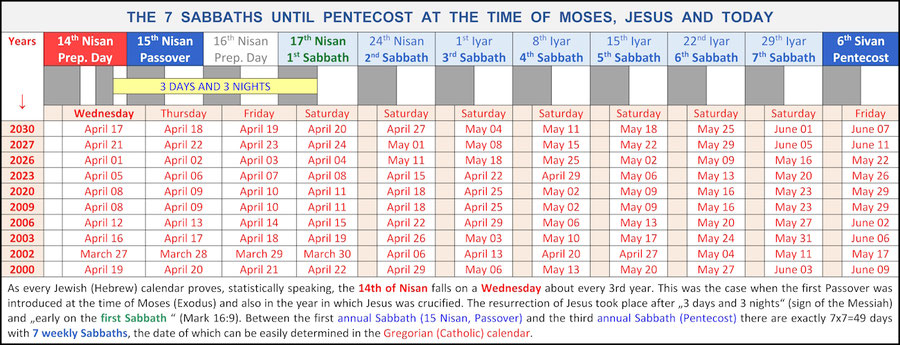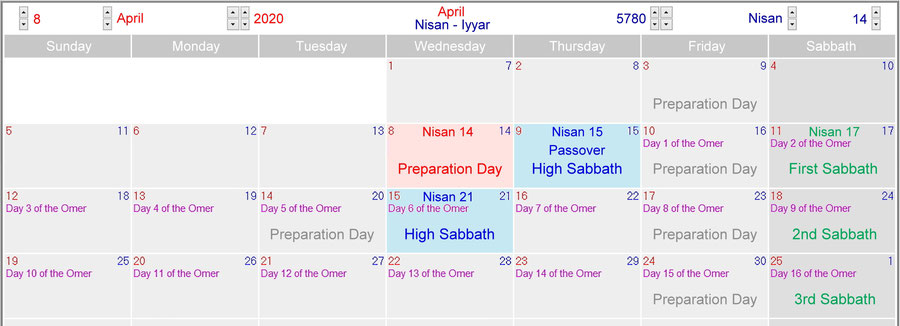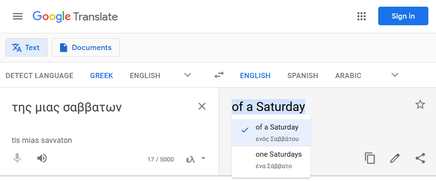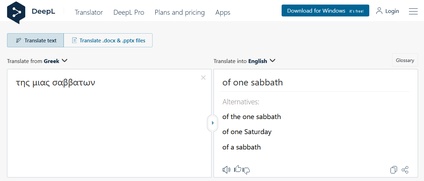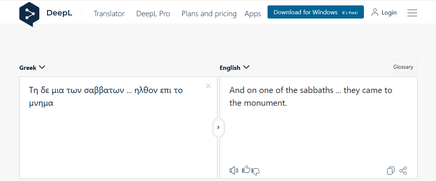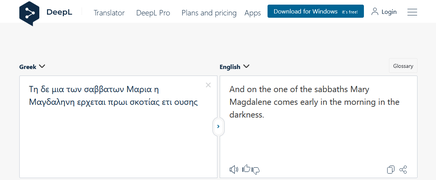- Home
- English
- Structure of the Bible
- Structure of the Menorah
- Ancient Menorahs
- Calendar and Feasts
- Resurrection on Sabbath
- Introduction
- Day
- Sabbath
- High Sabbath
- Pre-Sabbath
- Week
- Interlinear Bible
- Church Opinions
- 1. No Sunday
- 2. A Sabbath
- 3. No Friday
- 4. Intermediate Day
- 5. Three Days and Three Nights
- 6. Manipulations
- 6.1 Sabbath not Sunday
- 6.2 Plural σαββατων not week
- 6.3 one not first
- 6.5 Day of the Sabbaths
- 6.7 Lords Day
- 7. Old Bibles
- Greek Bibles
- Latin Bibles
- Gothic Bible
- English Manuscripts
- English Bible Prints 1
- English Bible Prints 2
- English Bible Prints 3
- English Bible Prints 4
- German Manuscripts
- German Bible Prints 1
- German Bible Prints 2
- Spanish Bibles
- Italian Bibles
- Swedish Bibles
- μια των σαββατων
- Mt 28-1
- Mk 16-2
- Mk 16-9
- Lk 24-1
- John 20-1
- John 20-19
- Acts 20-7
- 1Cor 16-2
- Lk 18-12
- 7 Languages
- Palm Sabbath
- Omer
- Summary
- The Rapture
- Rabbi Kaduri Note
- 666
- 888
- Video
- Info
- Historic Bibles Facsimiles
- Francais
- Deutsch
- Espanol
- Dutch
- Ελληνική
- Pусский
- Introduction
- Day
- Sabbath
- High Sabbath
- Pre-Sabbath
- Week
- Interlinear Bible
- Church Opinions
- 1. No Sunday
- 2. A Sabbath
- 3. No Friday
- 4. Intermediate Day
- 5. Three Days and Three Nights
- 6. Manipulations
- 6.1 Sabbath not Sunday
- 6.2 Plural σαββατων not week
- 6.3 one not first
- 6.5 Day of the Sabbaths
- 6.7 Lords Day
- 7. Old Bibles
- Greek Bibles
- Latin Bibles
- Gothic Bible
- English Manuscripts
- English Bible Prints 1
- English Bible Prints 2
- English Bible Prints 3
- English Bible Prints 4
- German Manuscripts
- German Bible Prints 1
- German Bible Prints 2
- Spanish Bibles
- Italian Bibles
- Swedish Bibles
- μια των σαββατων
- Mt 28-1
- Mk 16-2
- Mk 16-9
- Lk 24-1
- John 20-1
- John 20-19
- Acts 20-7
- 1Cor 16-2
- Lk 18-12
- 7 Languages
- Palm Sabbath
- Omer
- Summary
2. The day of Resurrection is called "Sabbath" 7 times
The 2nd scientific proof that Jesus rose from the dead on a Sabbath morning: Until now it has been described that in the NT the corresponding Greek words for "Sunday", "week" and "after the Sabbath" never appear.ow there is the 2nd biblical proof, namely the clear biblical naming of the day of the week on which the women came to the tomb. God NEVER made a secret of it. For him the day of resurrection has a clear and unambiguously defined name, namely NOT "Sunday (Hλίου ημέρα)", but "Sabbath". Yes, the Day of Resurrection is clearly named "Sabbath" seven times, both in the plural and in the singular (σαββατων, σαββατου), so that no misunderstandings can arise that another day might be meant. Only this day was mentioned in the resurrection chapter and no other. Every Christian can see this for himself in a few minutes (see Interlinear translation). The number 7 is the number of perfection and completeness. The Sabbath has always been the holy day of the Hebrews, and if now Sunday was to be the new holy day of the Christians, this great change should have been described exactly in the Bible. It would be a tremendous sensation if God would simply postpone his day of rest, which has existed since creation. But just the fact that such a situation is not even mentioned in the New Testament makes it clear that God always spoke only of the Sabbath. Sunday was mentioned 0 times in the whole Bible, but the Sabbath is mentioned 7 times in the resurrection chapter alone, and 70 times in the New Testament (see Interlinear Text).
Luke writes literally:
Lk 24:1: "τη (on, the) δε (but) μια (one) των (of the) σαββατων (Sabbaths) ορθρου βαθεως (twilight deep)... "
The translation into the English language is very simple: "But on a Sabbath (or: on one of the Sabbaths)... they came to the tomb." The Catholic Vulgate also sees it this way and translates into Latin: "Una (one) autem (but) sabbati (sabbath).". The first printed German Bibles even speak of "a Saturday" morning, so that no one can get the idea that Sunday could be meant (Mentelin 1466, Eggestein 1470, Pflanzmann 1475). Many translations in various national languages speak of either "on a Sabbath", "on a Sabbath day", "on a Saturday", "on one of the Sabbaths" or "on one of the Saturdays" or "on one of the Sabbath days". The German Bible manuscripts in particular cannot be surpassed in clarity. This is not a new doctrine, but a fact that has existed for almost 2,000 years and is written in VERY MANY BIBLES (see Old Bibles).
All 4 evangelists deliberately avoided using the corresponding Greek words for "Sunday", "Lord's day" or "week". Instead, they unanimously and independently of each other emphasized 7 times that the women came to the tomb "on a Sabbath". It could not be clearer:

The figure above shows the Greek text of the Alexandrian text family (Codex Sinaiticus, Nestle-Aland, NA28), which served as the basis for many modern translations. The Byzantine text (Textus Receptus) used by the Reformers differs only slightly in a few places:

The plural "σαββατων" has always been used in the ancient Greek language to describe also a single Sabbath in the singular due to special grammatical rules. There is much evidence of this, not only in the New Testament, but also in the Septuagint and in extra-biblical literature, e.g. in the books of Flavius Josephus.
Seven times there is talk of a special event "on one of the Sabbaths". This is logical, since there are always three Sabbaths in the seven-day Passover week every year, namely the two High Sabbaths (15th and 21st Nisan) with the one weekly Sabbath in between. The evangelists report what happened on one of these Sabbaths (plural). Some theologians say that in the sentence "mia ton Sabbaton" (μια των σαββατων), behind the female "mia", the Greek word "day" should be added, so the translations "on one [day] of the Sabbaths" or "on one of the Sabbath days" or "on a Sabbath day" are also possible. This is completely correct, since the Sabbath is also a day. However, even then it is still about a Sabbath day and not about any other day of the week or the Sunday. All this is unimportant, the main thing is that the Sabbath is not erased and not replaced by another day. The phrase "day of the Sabbaths", on the other hand, is nothing more than an ancient ancient Greek description of a single Sabbath day, which can easily be proved not only from the New Testament, but also from the Septuagint and extra-Biblical sources. In the 10 Commandments (Ex 20) of the Greek Septuagint translation, it says that the "day of the Sabbaths" (plural) should be kept, and on exactly the same "day of the Sabbaths" the women came to the tomb.

The Bible makes it very clear when the women came to the tomb. They went to the tomb "early, while it was still dark" (John 20:1). It was "very early, when the sun had risen" (Mark 16:2). All the apostles mention that the women went to the tomb early in the morning when it was still dark and it was gradually getting light. Matthew gives an even more precise indication, because he speaks of the middle of a Sabbath, namely the exact transition from evening (night phase) to morning (day phase) when the lightening began, i.e. at the dawn of the Sabbath. This is easy to translate and easy to understand: "οψε (evening) δε (but) σαββατων (Sabbath/s) τη (on the) επιφωσκουση (lightening, illumination, dawn) εις (to, into) μιαν (a, one) σαββατων (sabbath/s or sabbath days)...(came Mary...)" (Mt 28:1). Matthew never wrote anything about becoming light on a Sunday, but he clearly named the Sabbath morning by his name:
The FIRST of the SEVEN Sabbaths until Pentecost
Through the evangelist Mark, God not only told us that it was "on a Sabbath" when the women came to the tomb, but also exactly which Sabb it was, namely:
"αναστας (risen from the dead) δε (but) πρωι (early) πρωτη (first) σαββατου (sabbath)..." (Mark 16:9)
The Greek word prote (πρωτη) means first (or foremost) and the Sabbath (σαββατου, sabbatou) is in the singular. There is therefore only one correct translation possibility, namely: "early first Sabbath" or "early on the first Sabbath". Many Bible translators have translated this correctly, as numerous examples in the study sheet for Mk 16:9 show (examples). Those who are familiar with the biblical order of feast days know that this is the first Sabbath after the Passover (15th Nisan), that is, the first of the seven weekly Sabbaths up to Pentecost. The Jews have kept this counting to this day. Mark could not have said it more exactly. Just as there is a second, third and seventh Sabbath until Pentecost, so there is also the first. Just as there is the first of the four Sundays of Advent until Christmas, there is also the first Sabbath of the seven Sabbaths until Pentecost. What is difficult to understand about this?
There is only one definition for this "first Sabbath" and therefore only one specific Sabbath can be meant, namely the "first Sabbath" after Nisan 15 (Passover). Only ignorant people confuse this expression with the "first day of the week" or with "on Sunday". It has nothing to do with this, because there have always been Greek and Latin (Vulgate) words for this, and long before the English, Spanish, French, German and teh Slavic languages even existed. If God had meant the week or Sunday, he would have said it. The corresponding Greek word for "week" (see week) was already in the Bible more than 200 years before the birth of Jesus, namely in the Greek translation (Septuagint). Even the famous historian Flavius Josephus (*37 or 38 in Jerusalem, born Yosef ben Matityahu ha Kohen; † after 100 in Rome), who came from the same nation, lived in the same geographical area and at the same time as the Evangelists, used the corresponding Greek word for "week" several times in his writings. So nobody can say that the evangelists had to talk about a "Sabbath" when they supposedly meant the "week". If the evangelists had meant this word and not the Sabbath, they would have said it. Just as there is the "first Sunday" in Advent, there is also the "first Sabbath" in the counting of the seven Sabbaths until Pentecost, which have been counted this way for 3,500 years until today. What is difficult to understand here? In the Bible the counting up to the feast of Pentecost is described in detail:
Lev 23:15-16: "You shall count seven full weeks [literally: seven Sabbaths] from the day after the Sabbath, from the day that you brought the sheaf of the wave offering. 16 You shall count fifty days to the day after the seventh Sabbath [the Sabbath the seventh]. Then you shall present a grain offering of new grain to the Lord."
So if there is a "seventh Sabbath", then there must of course also be a "first Sabbath" and a "second Sabbath" and so on. Therefore the phrase mentioned by Mark "early on the first Sabbath" (Mark 16:9) was understood by every child. Today, however, very few Christians know this, because they reject the Old Testament and do not want to know anything about a calendar of God. Just as the world today counts the 4 Sundays of Advent to Christmas, so the Israelites have counted the 7 Sabbaths to the "Feast of the weeks" (=Shavuot, Pentecost). Just as there is the "first Sunday" in Advent until Christmas, there is also the "first Sabbath" until Pentecost. What is difficult to understand here? The Jewish calendar shows the 7 Sabbaths for each year. The following table shows the years in which the 14th Nisan fell on a Wednesday:
The following illustration shows the "first Sabbath" during Passover in the years when Nisan 14 fell on a Wednesday. The data correspond to the Jewish calendar, which however is not always identical with the calendar of God (more info).

Once again, whoever wants to say "early first Sabbath" in the genitive singular in the ancient Greek language has only one possibility: "πρωι (early) πρωτη (first) σαββατου (Sabbath)" (Mark 16:9). The Sabbath was called by God in the singular genitive and not the Sunday (Hλίου ημέρα) or the week (εβδομαδα). There is simply no clearer and more explicit way. All the theologians who think that the plural σαββατων (sabbaton) could supposedly also mean Sunday or the week or "after the Sabbath" learn at the latest from the words of Mark that their theory must be a joke.
In 2020 there was the same sequence of days during the Passover as in the year Jesus was crucified. The 14th Nisan fell on a Wednesday and the 17th Nisan on the "first Sabbath" (April 11, 2020):
Psalm 24:1 does not replace the Sabbath
The Septuagint has some additions that are not in the basic Hebrew text, but are nevertheless very interesting to better understand the ancient Greek language. In Psalm 24:1 the same words (της μιας σαββατων) are used as in Mark 16:2 (Link). It is clear that the Jews did not mean Sunday, nor the first day of the week, but the Psalm of David was to be read "on a Sabbath" or "on one of the Sabbaths". Yet this passage is translated in some Bibles as "on the first day of the week." This is incorrect, for it does not speak of the week, nor of the "first Sabbath" (see Mark 16:9), but of the "one Sabbath" or "one of the Sabbaths." The corresponding Greek word for "week" (hebdomada) was explicitly not used, although it is mentioned several times in the Septuagint (examples). Therefore, the translators have falsified or substituted 3 words: [1.] first (instead of a/one), [2.] the word "day" was added (often written in italics), and [3.] week (instead of Sabbath). If some Jewish circles read certain Psalms on special days of the week, it is their own decision. This was not prescribed in the Bible. Nevertheless, the headings are additions to the Bible, because the Hebrew text does not have these texts. But the fact is that no Greek or Jew could ever say "on one of the Sabbaths" or "on the first Sabbath," because then it would supposedly always have to mean "on a Sunday." This is crazy. Here is a correct translation of the Septuagint from the Apostolic Bible Polyglot (ABP) with the literal meaning:

The APB has added the words "day" and "of" (italics) to Mark 16:2,9; but it would be even easier to understand without this unnecessary addition.
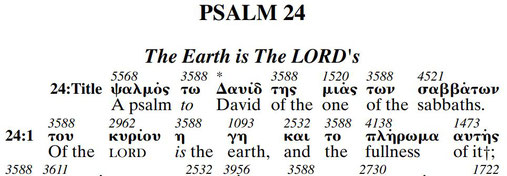
The ABP shows very clearly in the PDF version that the additionally inserted heading "on/of the one of the Sabbaths" (which is missing in most Bibles or given in two square brackets) has nothing to do with the "week". In the Septuagint the Greek "week" (see week) is mentioned several times and if this had been meant, it would be here.
Google Translator translates the 3 words "της μιας σαββατων" (plural genitive; τῆς μιᾶς σαββάτων) of the heading of Psalm 24:1 and Mk 16:2 (Textus Receptus) as "of a/one Saturday" and not "of a Sunday" (μιας ημέρας του ήλιου; μία Κυριακή) or "of a first day of the week" (μιας πρώτης ημέρας της εβδομάδας), because the ancient Greek language has always had its own words for this.
The free online translation program DeepL is even more accurate and gives many alternatives (in the submenu when the respective word is clicked): on one Sabbath, on one of the Sabbaths, of one Sabbath, of one Saturday, of the one Sabbath, one Sabbath, of a Sabbath.... but never "on a Sunday" (μιας ημέρας του ήλιου; μία Κυριακή) nor "after a Sabbath" (μετά το Σάββατο; μετά το ένα Σάββατο) and certainly not "on the first day of the week" (την πρώτη ημέρα της εβδομάδας). In other languages it is often more accurate than in English, because these languages (e.g. German) also know the genitive form, which does not exist in English, which has a simple structure. Nevertheless, it is clear what is meant:
Only for theologians and pastors who do not know God's calendar do these Greek words seem illogical, which otherwise every Greek child understood. Because the theologians cannot bear that Jesus rose from the dead after "3 days and 3 nights" (see Sign of the Messiah) "on a Sabbath", "on the one of the Sabbaths", more precisely "early on the first Sabbath" (Mk 16:9), they try to make "a Sunday" out of "a Sabbath" by new dubious word definitions. Most embarrass themselves because they do not know the difference between cardinal and ordinal numbers (one, first; see Interlinear and "one not first"). The "first day of the week" cannot be meant because there are other Greek words for it (hedomada = sevenness, a period of seven) and because otherwise no Greek could ever say "on the one Sabbath" or "on the first Sabbath" in the genitive form, because it would then always have to mean "on the one Sunday" or "on the first Sunday" (e.g. first Sunday of Advent, or the first Sunday in May...). Those who do not know God's calendar, but only the Catholic calendar of the Pope, cannot understand all this.
The concordant translation
The Concordant Literal Version (CLV, see Scripture4All) is even more accurate. Any child can understand that:
Mt 28:1 Now it is the evening of the sabbaths. At the lighting up into one of the sabbaths came Mary Magdalene...
Mk 16:2 And, very early in the morning on one of the sabbaths, they are coming to the tomb at the rising of the sun.
Mk 16:9 Now, rising in the morning in the first sabbath, He appeared first to Mary Magdalene...
Lk 24:1 Now in the early depths of one of the sabbaths, they, and certain others together with them, came to the tomb...
Jn 20:1 Now, on one of the sabbaths, Miriam Magdalene is coming to the tomb in the morning, there being still darkness…
Jn 20:19 It being, then, the evening of that day, one of the sabbaths, and the doors having been locked where the disciples...
Google Translator and DeepL confirm the Sabbath and Saturday
There are several free translation programs that show us clearly what is meant in the New Testament. Like all the languages of the world, the Greek language has received changes in grammar and pronunciation over the centuries, but it has never been the case that a Sabbath (or Saturday) has been made into a Sunday or a seven-day week (see week). These are linguistic adventures that never existed:
No one has yet succeeded in finding Sunday (ημέρας του ήλιου), Lord's Day (Κυριακή) or week (εβδομαδας) in the basic Greek text of the NT. It is not written:
God was very specific in the NT and He spoke of the Sabbath 7 times in the singular and plural (see Interlinear) so that we would not even get the idea that another day could be meant.
The 7 Sabbaths mentioned in the Resurrection Chapter of the NT
There is not just one, but even seven biblical testimonies that the women came to the tomb "on a Sabbath", namely Mt 28:1a, Mt 28:1b; Mk 16:2; Mk 16:9; Lk 24:1 and Jn 20:19. The last mentioned passage speaks of the evening of the same Sabbath day on which Jesus appeared to the disciples. Literally it says: "ουσης (as it was) ουν (now) οψιας (evening) τη (the) ημερα (day) εκεινη (that, the same) τη (the) μια (one) σαββατων (Sabbath/s) και (and) των (the) doors being locked where the disciples were for fear of the Jews, Jesus came and stood among them and said to them, “Peace be with you.”" Martin Luther had the same opinion, who translated "in the evening of the same Sabbath". Many Catholic translators saw it the same way before and after him. This is not a new teaching. So it was about the same Sabbath and not about the "same Sunday".
There are pastors who claim that it is not so important for them when Jesus was resurrected, because all that matters is that he was resurrected. But God has a completely different opinion, because for him it was extremely important to clearly name the exact day and announce it to the whole world, so that they don't hold a wrong day. The 7 is the number of perfection and completeness. Four different scribes, independently of each other, have clearly named the resurrection day 7 times. The women came to the tomb:
- "on one of the Sabbath(s)" (Mt 28:1b; Mk 16:2; Lk 24:1; Jn 20:1).
- in the early morning, still in the night phase of the Sabbath (Matt. 28:1a), just when it began to become light on that very Sabbath (Matt. 28:1b). This is exactly in the middle of the Sabbath, when the sun was just rising.
- "on the first Sabbath", that is, the first of the seven weekly Sabbaths until Pentecost (Mk 16:9).
- And in the evening, on these same one Sabbath, the disciples were together in one place and Jesus appeared to them (John 20:19).
Could God express it seven times more clearly? No! How many times was the "Sunday" and "week" mentioned in the NT? Answer: Not once, 0 times. Christians who are not familiar with God's calendar of feast days, nor with the biblical definition of essential basic words, and who equate preparation day with Friday, will never be able to understand the clear statements of the apostles. Luther's original translation has been printed millions of times over the centuries. It has been preserved in many cases to this day and can be downloaded free of charge from the Internet (see Luther Bible); yet many people are not really aware that it says that Jesus rose from the dead "on a Sabbath" and not "on a Sunday". And many pastors deny the sign of the Messiah (3 days and 3 nights in the tomb, Mt 12:38-40) and make Jesus a liar just so they can sanctify the pagan Sunday and make the Sabbath a preparation day for Sunday. If God really meant Sunday, then in the ancient Greek language he would have over 20 possibilities to express this clearly (see examples: No Sunday).
The theological distortions and substitutions of the Sabbath
Because some Bible translators wish for a Sunday resurrection of Jesus, they have invented several new idioms that mean something completely different from the original Greek text, both in terms of content and grammar. Examples: "after the Sabbath", "the day after the Sabbath", "the first day of the week", "the Lord's day" or "Sunday." All these replacements do not have the right to be part of the NT. If the evangelists had NOT meant the Sabbath, they would have used other words. They had at least 20 ways to do this, as proved in chapter 1. The eternal fact is:
God spoke 7 times of the Sabbath and 0 times of Sunday
The resurrection day is clearly named "Sabbath" and sealed seven (7) times in the NT!
This is confirmed not only by the basic Greek text, but also by numerous Catholic Bible translations worldwide. But theologians want to force us to sanctify a pagan day that has not been mentioned once in the entire Bible? We should observe the pagan holiday of Jesus' murderers and at the same time abolish the holiday of the Creator of the earth?
"Prove all things; hold fast that which is good. Abstain from all appearance of evil"
(1Thess 5:21-22)
"Take no part in the unfruitful works of darkness, but instead expose them"
(Epheser 5:11)

